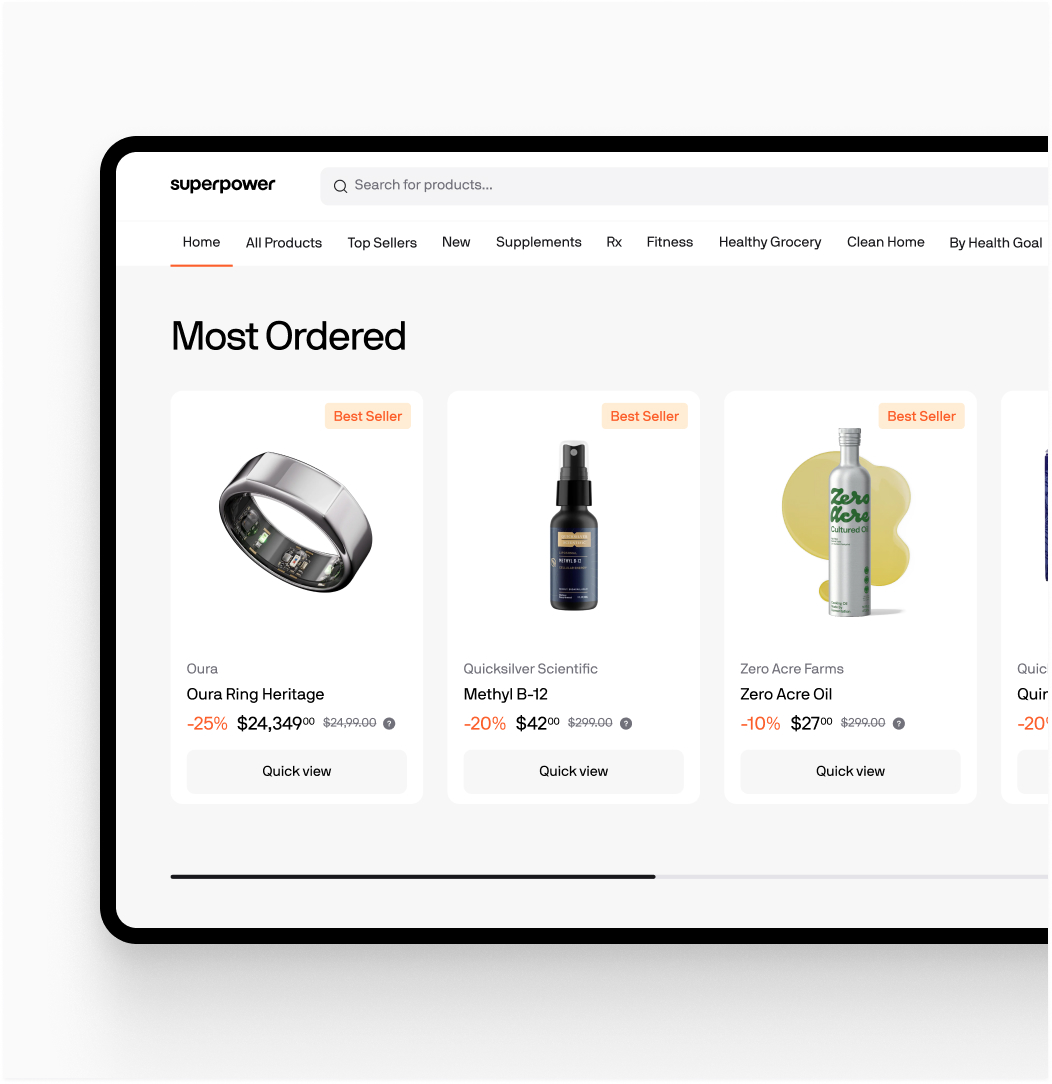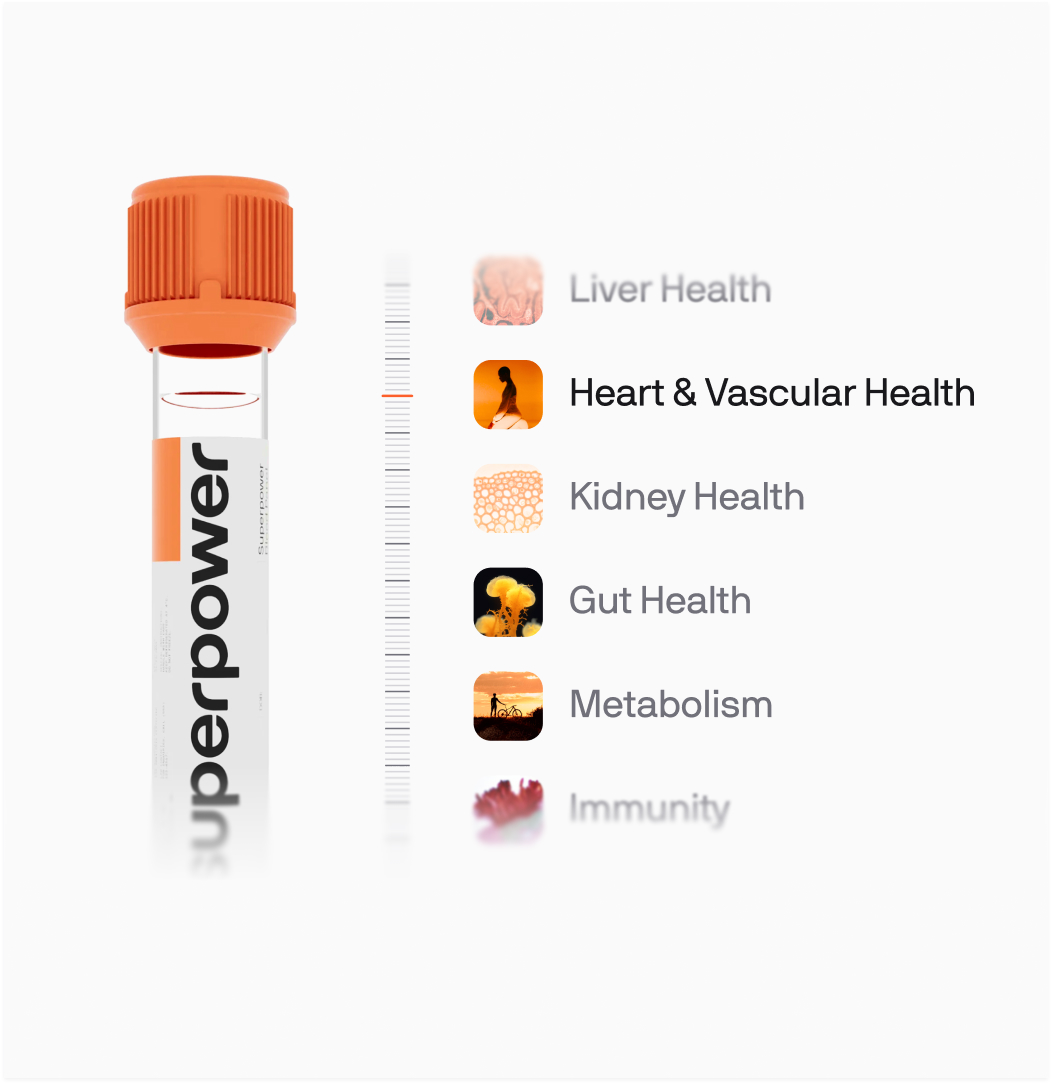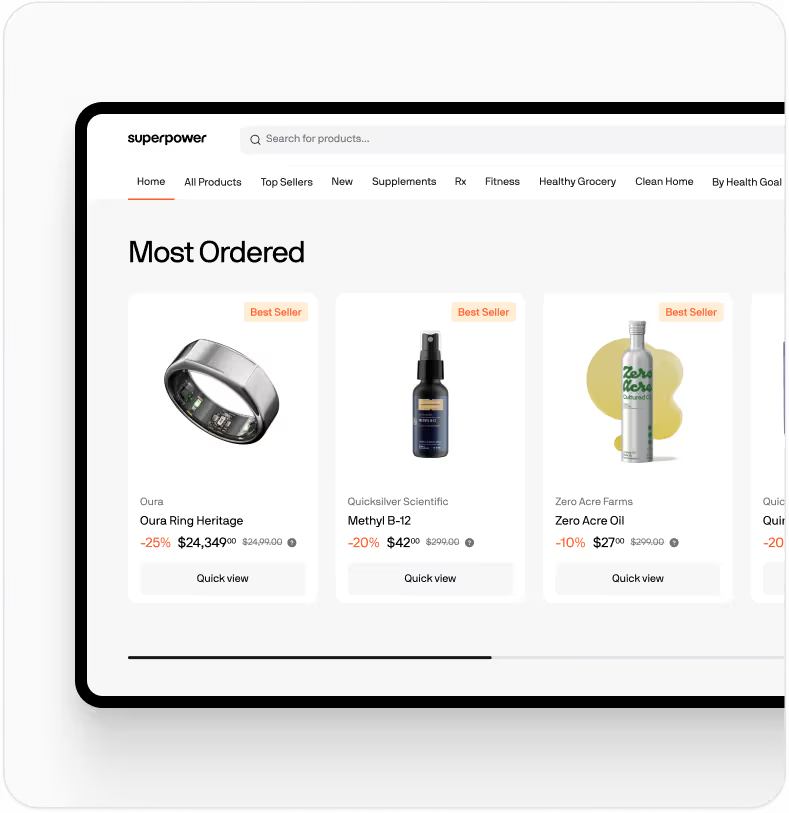What's Included
Your Superpower starts with 100+ lab tests.
Here is everything we test.
Longevity Markers
Biological Age reflects how your body is aging on a cellular level relative to other people. We run select blood biomarkers known to be strongly associated with aging through an open-source, peer-reviewed biological clock algorithm called PhenoAge by Yale Scientist Morgan Levine, PHD.
Rate of Aging is a personalized measure of the pace at which your body has aged for every year you’ve been alive.
Superpower score is the ultimate score of personal health as it takes into account every dimension of your health like health optimization, toxin levels, nutrition & gut and look & feel.
Heart Health
An enzyme found in muscles, and high levels in your blood may indicate muscle damage or stress, including after intense exercise.
A type of lipoprotein associated with an increased risk of cardiovascular diseases.
A protein that plays a crucial role in lipid metabolism and is a marker of cardiovascular risk.
A type of fat found in the blood that is used for energy but can increase the risk of heart disease if levels are too high.
Often referred to as 'bad' cholesterol, high levels can lead to plaque buildup in arteries and increase the risk of heart disease.
Known as 'good' cholesterol, it helps remove other forms of cholesterol from the bloodstream.
A measure of cardiovascular health, reflecting the balance of good and bad cholesterol.
The total amount of cholesterol in the blood, including LDL and HDL cholesterol.
Similar to LDL, VLDL is a type of "bad" cholesterol that primarily carries triglycerides in your blood and contributes to fatty deposits in your arteries.
Thyroid Health
A molecule that acts like a messenger, telling your thyroid gland how much hormone to produce; abnormal levels can signal an underactive or overactive thyroid.
The active form of key thyroid hormones that regulates your metabolism, energy, and overall health, giving insight into your thyroid's functionality.
The active form of thyroid hormone that regulates metabolism and energy production.
A hormone primarily involved in stimulating milk production after childbirth, but elevated levels can also indicate hormonal or pituitary issues.
Immune Regulation
The most common type of white blood cell, acting as the first responders to bacterial infections and injuries.
A type of white blood cell that engulfs and digests cellular debris and pathogens.
Cells that play a role in allergic responses and inflammation.
The body's defenders against infections and illnesses; a high or low count can signal immune system activity or health issues.
A type of white blood cell that plays a critical role in fighting bacteria, viruses, and toxins.
Specialized white blood cells that combat parasites and are involved in allergic reactions or inflammation.
Hormone Health
The total amount of testosterone, a hormone responsible for male characteristics and reproductive functions.
The portion of testosterone that is not bound to proteins and is available to tissues.
A hormone primarily involved in stimulating milk production after childbirth, but elevated levels can also indicate hormonal or pituitary issues.
Helps regulate reproductive processes by promoting the growth of eggs in ovaries or sperm in testes, making it essential for fertility.
Triggers key reproductive functions, such as ovulation in women and testosterone production in men.
A form of estrogen, a hormone that plays a key role in female reproductive health and menstrual cycle regulation.
A precursor hormone for estrogen and testosterone that supports overall hormonal balance.
A protein that binds to sex hormones, regulating their availability in the bloodstream.
A hormone that helps regulate metabolism, immune response, and stress levels.
Used to assess pregnancy viability, as well as to evaluate function in reproductive health.
A protein produced by the prostate gland, in which elevated levels can indicate prostate issues (Male only).
Metabolic Health
Your body's primary energy source, and its levels in the blood can signal issues like diabetes or low blood sugar.
A measurement that reflects your average blood sugar levels over the past three months, serving as a key indicator of long-term glucose control.
A hormone that helps regulate blood sugar by allowing glucose to enter your cells; imbalances can indicate diabetes or insulin resistance.
A waste product formed when your body breaks down certain foods. High levels can lead to gout or kidney issues.
Nutrients
Essential for red blood cell formation, neurological function, and DNA synthesis.
Supports bone health, immune function, and mood regulation, and its levels are affected by sun exposure and diet.
A mineral essential for carrying oxygen in your blood, and low levels can lead to fatigue or anemia.
Measures how much of your blood’s iron-binding capacity is being used to transport iron, helping assess iron levels.
A waste product formed when your body breaks down certain foods. High levels can lead to gout or kidney issues.
An amino acid in your blood, and elevated levels can increase the risk of heart disease or indicate vitamin deficiencies.
Measures how well your blood can carry and bind to iron, providing clues about your iron status and overall health.
Liver Health
An enzyme that reflects liver function and bile duct health, with high levels often linked to liver disease or alcohol consumption.
Measures the combined levels of proteins in your blood, including albumin and globulin, which are essential for immune function and overall health.
A protein made by the liver that helps maintain fluid balance in your body and transport essential substances in the blood.
Reflects the breakdown of red blood cells and liver function, with high levels often indicating liver or bile duct issues.
An enzyme found in the liver and other tissues; elevated levels may signal liver damage or muscle injury.
An enzyme produced by the liver, and elevated levels are often a marker of liver inflammation or damage.
An enzyme related to liver, bone, and bile duct health, and abnormal levels can indicate liver disease or bone disorders.
An amino acid in your blood, and elevated levels can increase the risk of heart disease or indicate vitamin deficiencies.
Kidney Health
Measures the amount of urea in your blood, providing insight into how well your kidneys and liver are functioning.
A waste product from muscle activity that your kidneys filter out, and its levels can indicate kidney health.
Compares BUN and creatinine to help distinguish between different causes of kidney or dehydration-related issues.
A group of proteins involved in immune responses and transporting nutrients, and its levels help evaluate liver and immune health.
The albumin/globulin ratio compares two major types of proteins in your blood and can signal liver, kidney, or immune system conditions.
Estimates how well your kidneys are filtering waste from your blood, with lower values indicating reduced kidney function.
A mineral essential for bone health, muscle function, and nerve signalling.
An electrolyte that helps regulate fluid balance and blood pressure.
An electrolyte important for muscle function and nerve signalling.
Heavy Metals & Electrolytes
A heavy metal that can accumulate in the body, affecting the nervous system and overall health.
A mineral essential for bone health, muscle function, and nerve signalling.
An electrolyte that helps maintain fluid balance and pH levels in the body.
An electrolyte that helps regulate fluid balance and blood pressure.
An electrolyte important for muscle function and nerve signalling.
Inflammation
An amino acid in your blood, and elevated levels can increase the risk of heart disease or indicate vitamin deficiencies.
A marker of inflammation in your body, and elevated levels can indicate a higher risk of heart disease or chronic conditions.
A waste product formed when your body breaks down certain foods. High levels can lead to gout or kidney issues.
Blood
Measures how many red blood cells are in your blood, which are vital for carrying oxygen throughout your body and supporting overall energy levels.
The protein in red blood cells that carries oxygen, and its levels can indicate anemia or other blood conditions.
Measures the proportion of your blood made up of red blood cells, providing insight into oxygen-carrying capacity and hydration status.
Indicates the average size of your red blood cells, which can help clue in the type of anemia you may have.
Reflects the average amount of hemoglobin in each red blood cell, helping assess different types of anemia.
Measures the number of platelets, which are critical for blood clotting and wound healing, in your blood.
Shows how much variation exists in the size of your red blood cells, which can point to anemia or nutrient deficiencies.
Measures the concentration of hemoglobin within red blood cells, offering clues about anemia or blood disorders.
A waste product that your body makes when it uses food for energy
Plus add-on diagnostic testing available
Access comprehensive tests well beyond mainstream healthcare limits.
Trusted by world-class
medical professionals
Supported by the world’s top longevity clinicians and MDs.




Dr Anant Vinjamoori
Superpower Chief Longevity Officer, Harvard MD & MBA

Dr Leigh Erin Connelly
Clinician & Founder of The Centre for New Medicine

Dr Molly Maloof
Longevity Physician, Stanford Professor

Dr Abe Malkin
Founder and Medical Director of Concierge MD

Dr Robert Lufkin
UCLA Medical Professor, NYT Bestselling Author

membership
42

.avif)


Superpower Membership
Your membership includes:
- 60+ biomarkers tested immediately, with a follow-up panel in 6 months to track changes. (100+ in total)
- A custom protocol from our longevity advisors
- 17 health scores and your biological age
- Al Chat to dig deeper into your data
Many concierge clinics charge $10k – $100k for their services, we’ve built technology to make the world’s best healthcare as accessible as possible.
You will be able to schedule a 15 minute appointment (blocked out just for you) at one of our partner clinics. At home visits can also be scheduled for an additional $99 fee.
- Understand your results in a beautiful dashboard
- 24/7 access to a concierge medical team
- Lab draw at-home option (extra charge)
- Only one draw needed rather than two, because we use Labcorp rather than Quest
- 20% discount across our supplement marketplace. Highly curated brands at big savings for the lifetime of your membership
- Personalized action plan created by your medical team
- AI chat with all of your data
No insurance needed. One flat fee, no co-pays or surprise charges. HSA/FSA cards accepted.
Superpower specializes in prevention-based testing and treatments and is not intended for emergency or immediate health issues.
While you will have a Superpower concierge, your annual membership is designed to complement a primary care doctor if you have one, not replace them.
We are happy to help you share any test results with an outside provider to ensure you receive well-rounded medical care.
Most primary care doctors aren’t trained to run this kind of advanced testing. We’ve negotiated special lab rates so we can offer 100+ tests at a fraction of the usual cost — often 1/4th the price.
It is our belief that if you improve your health, you can improve every other aspect of your life.
However, mainstream medicine has not helped many of us do that.
It is often one size fits all, reacts too late, and misses the full picture.
We built Superpower to fix that.





















